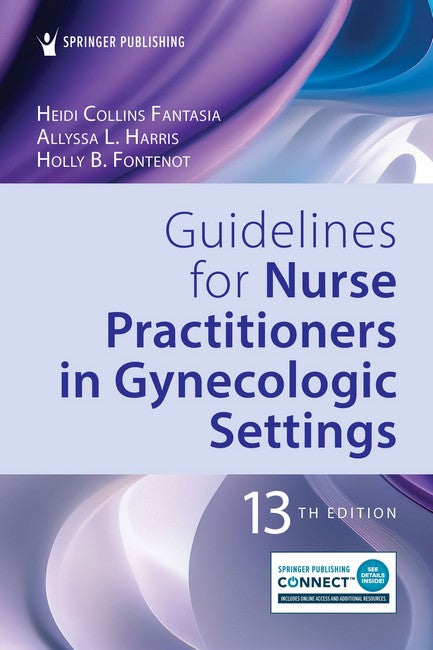Heidi Collins Fantasia, PhD, RN, WHNP-BC, FNAP, FAAN, is an associate professor and department chair in the Zuckerberg College of Health Sciences, Solomont School of Nursing at the University of Massachusetts Lowell, and has been a board-certified womens health nurse practitioner since 1997. She has practiced clinically in a variety of settings including obstetrics/gynecology, primary care, and a Title X public health clinic. She is the author of more than 100 publications, including peer-reviewed manuscripts, books, book chapters, and editorials that focus on various aspects of womens and gender related health throughout the life span. Her research interests include the intersection of violence and the reproductive health of women, including violence screening, womens experiences of violence, issues surrounding sexual consent and coercion, and human trafficking. Dr. Fantasia previously served on the Board of Directors for the National Association of Nurse Practitioners in Womens Health from 2019-2021 and is the current editor of the journal Nursing for Womens Health. She is a Distinguished Practitioner and Fellow in the National Academies of Practice and a Fellow in the American Academy of Nursing. Dr. Fantasia received a bachelor of science in nursing from Salem State College in Salem, Massachusetts, and masters and doctoral degrees from Boston College in Chestnut Hill, Massachusetts. She completed a postdoctoral fellowship at Boston College prior to joining the faculty at the University of Massachusetts.
Allyssa L. Harris, PhD, RN, WHNP-BC, FNAP,is Dean and Professor of the College of Nursing at Prairie View A&M University, Houston, Texas. Formally Dr Harris was associate professor and program director for the Womens Health Nurse Practitioner program at the William F. Connell School of Nursing at Boston College. Dr. Harris has been a board-certified womens health nurse practitioner since 1996 and has practiced clinically in a variety of settings, including federally qualified community health centers and family planning agencies. She has authored numerous data-based and clinical publications. Dr. Harris program of research centers on reducing adolescent sexual risk behaviors. In particular, she is focused on understanding the role of parent–adolescent sexual communication on sexual risk behaviors. She has received awards for education from the New England Regional Black Nurses Association and the Inspiration in Womens Health award from the National Association of Nurse Practitioners in Womens Health. She is a member of the Honor Society of Nursing, Sigma Theta Tau International, the National Association of Nurse Practitioners in Womens Health, the Association of Womens Health, Obstetric, and Neonatal Nurses (AWHONN), and is a Distinguished Practitioner and Fellow in the National Academics of Practice. Currently, Dr. Harris is a member of the board of directors and secretary for National Association of Nurse Practitioners in Womens Health and is a member of the Editorial Advisory Board and a column editor for the journal Nursing for Womens Health. Dr. Harris received her associate degree in nursing from Gardner-Webb College, Boiling Springs, North Carolina, and her bachelors, masters, and doctoral degrees from Boston College.
Holly B. Fontenot, PhD, RN, WHNP-BC, FNAP, FAAN, is a professor, Research Director for Department of Nursing, and Frances A. Matsuda Chair in Womens Health at the School of Nursing at the University of Hawaii at Manoa. She has been a board-certified womens health nurse practitioner since 2000, and has practiced in multiple settings, including 10 years at the Sidney Borum Jr. Health Center, a program of Fenway Health. Fenway Health is a federally funded health center that focuses on providing quality/competent care for sexual and gender minority persons. Dr. Fontenot is also Adjunct Faculty at The Fenway Institute as well as an Associate Member at the University of Hawaii Cancer Center. She is a member of the CDC, Adult/Child Combined Immunization Workgroup and a nursing leader at the Society of Adolescent Health and Medicine. Prior to her move to Hawaii, Dr. Fontenot was the Program Director for the Boston College Womens Health Nurse Practitioner program for over 10 years. Her nationally funded program of research focuses on cancer prevention (with a particular focus on HPV associated cancers), adolescent and young adult vaccination, and adolescent health. Her work has enhanced care delivery associated with human papillomavirus (HPV) vaccination, HPV-associated cancer screening, and comprehensive adolescent health, including elucidating the importance of sexual and gender minority-affirming care on health outcomes. She has authored numerous national webinars/presentations and nearly 100 publications. Dr. Fontenot is a Distinguished Practitioner and Fellow in the National Academies of Practice and Fellow in the American Academy of Nursing. She is a member of numerous professional organizations including Sigma Theta Tau International and the National Association of Nurse Practitioners in Womens Health. Dr. Fontenot received her bachelor of science from the Georgia Baptist College of Nursing at Mercer University and her masters and doctoral degrees from Boston College.

